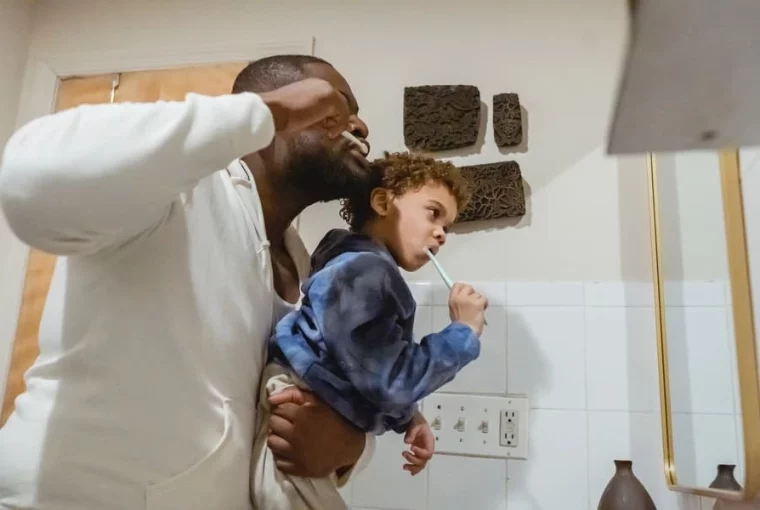First teeth might appear between six and ten months. It’s entirely individual, but you shouldn’t be surprised if they appear as early as three months or stay hidden until your baby is one year old. Still, you probably know about the basic oral hygiene steps for babies, like cleaning their gums with wet gauze or a soft baby toothbrush. Many dentists advise booking the first dental appointment after the first birthday when some teeth have come out already. Since that period, you, as a parent, have the entire responsibility of keeping them clean and healthy.
Dental Care For Toddlers
We all know how challenging teeth brushing can be while having an energetic, playful toddler. Every parent should have in mind that it is a great time to start creating new habits, which are crucial for oral health. Use only a soft-bristled toothbrush with water until your child is 18 months old unless your dentist says differently. Try to gently brush their teeth and gums at least twice a day. For those older toddlers, after turning two years, you can slowly start with teaching about oral care. The key part is to explain to them why that is so important. Pictures, videos, cartoons, or books for toddlers can help a lot. The next step would be letting your child hold a toothbrush so he can feel that he’s a part of the action. As time passes, you should give him space to try himself with your supervision.
How To Teach A Toddler To Brush Teeth Himself?
Considering the advice from above, you should start encouraging your child to try it themselves. With these processes, the main problem can be a great expectation that parents usually have. Not every child is that independent and confident to do it on its own right away, and it may take time, so try to:
Start when they’re young
While this is not a necessary step (and it may not be possible if you now have a toddler), it can significantly aid in developing healthy oral habits in children. Many experts suggest you start using soft infant toothbrushes – as early as after the birth. Such toothbrushes are suitable for cleaning your baby’s mouth and gums. After the eruption of baby teeth, you can start adding a very small amount of fluoride toothpaste to the routine.
Brush together
Parents are the main role models to their kids, and it’s quite obvious that they are trying to imitate your behavior. Using this fact is our advice for every parent who’s teaching a toddler to brush teeth on his own. Go to the bathroom and brush together. He will follow your steps by watching mom or dad brushing their teeth. After that, you can have a talk about oral hygiene and why it is so important.
Sing a song
Many studies have shown that kids are very much into the sense of security they get from routines. Pair that with their love of learning through music, and you’ll have a much easier time getting them to brush their teeth.
Go to your dentist
Going on a regular check-up might help with the potential fear that kids often develop. Ask some friends or family to recommend to you the dentist that is great with kids so he can explain to your toddler the whole process and motivate him to brush his teeth regularly.
Focus on positive reinforcement
This step is especially important; positive reinforcement is finally making its way to numerous aspects of raising children. When it comes to brushing their teeth, this technique does wonders by encouraging them to keep up the good work. Anything from a sticker chart to their favorite bedtime story can be an excellent way to support their efforts.
Avoid scare tactics
Telling your child their teeth will fall out, threatening them with a dentist visit, and similar methods are a big no. It would be best if you focused on all the benefits they’ll get by taking good care of their oral health instead of trying to motivate them by fear.
Take turns
If the toddler is ready to brush their teeth without your help, make a deal. Just allow him to do the morning routine alone to make him feel proud and independent, and you brush his teeth before bed. Making compromises will help both sides.
Let him choose supplies
Going to the store together can have a positive effect. Let your child choose his first toothpaste and toothbrush. There are numerous types and sizes, but we recommend soft-bristled toothbrushes for the very beginning, as well as non-fluoride toothpaste. You can find various flavors like apple or strawberry, but it’s better to wait for fluoride toothpaste until your child is three.
Practice in DIY teeth or stuffed animals
This is another tip that can make teeth brushing a fun and exciting process. Whether your toddler has a toy with teeth or you decide to create a DIY model, this can be a fun way for them to practice and learn the right techniques. Make sure to encourage them whenever they’re doing great.
Conclusion
Creating an oral care routine with your toddler can be a wonderful time for you to bond with them. By following the tips we listed above, you’ll ensure they develop an important habit that will have an immense impact on their oral health in the future. Don’t get tricked into thinking baby teeth are not important for their future teeth development; if they lose too many teeth too early, it can cause several issues with their adult set of teeth.
Even if it’s hard at the beginning, you have to stay positive. Talk to your toddler as much as you can, and stick to the routine. Lowering your expectations can help you ease that pressure you’re putting on your toddler. Remember that every child is different, says dentist Harrisburg NC. Give him some space and a lot of time and patience.




